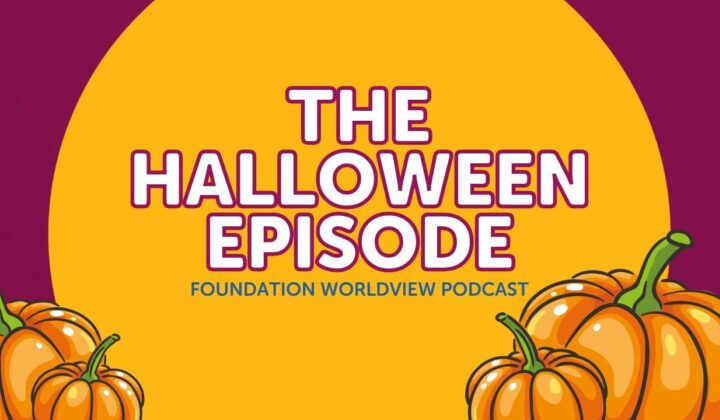Learn more about the journey that led to us equipping kids to carefully evaluate every idea they encounter.
Meet members of our team who have contributed to curriculum development.
Hear from real users of the Foundation Curriculum.
Learn what we believe about God, Jesus, Scripture, and more.
Should Christians Observe Advent, Lent, and Holy Week?
Is observing Advent, Lent, or Holy Week appropriate for evangelical Christians? In this episode, Elizabeth Urbanowicz explores whether following the church calendar aligns with a biblical worldview. She provides practical suggestions for incorporating these traditions into family life to help focus children's hearts and minds on the gospel. Whether you're familiar with these rhythms or curious about their benefits, join us for a thoughtful discussion that equips parents to lead their families in intentional discipleship.
Transcript
Note: The following is an auto-transcript of the podcast recording.
Hello, friends. Today's podcast question says, "Should evangelical Christians observe things like Advent or Lent or Holy week? I find that it's meaningful to go through these parts of the Christian calendar with my children, but many say that it's a Catholic thing and that it's not appropriate for Christians." Really interesting question that we're going to dive down deep into today on the Foundation Worldview Podcast where we seek to answer your questions so that you can equip the children that God has placed in your care to carefully evaluate every idea and understand the truth of the biblical worldview. I'm your host, Elizabeth Urbanowicz, but I'm thrilled that you've joined me for another episode today.
Now, first I just wanted to say if you are a listener who is Catholic, please don't hear me saying that you are not a Christian by addressing this question. I have a number of Catholic friends who believe the gospel of Jesus Christ as it is presented in Scripture. Now, I would encourage you to investigate some of the teachings of the Catholic church and see whether or not they align with Scripture because I do believe that the official teachings of the Roman Catholic Church do add to the gospel in a way that is not outlined in Scripture. Mike Winger, the Bible thinker, has an excellent series on Catholicism, so if you're interested in more information on that, you can just check out his series on Catholicism. But just wanted to start off by framing the question that way, that if you are Catholic, I am not saying that you cannot be a Christian because I do know from Catholic friends who believe the gospel would just encourage you to check out the teachings, the official teachings of the Catholic church and whether or not they align with Scripture.
Now for this questioner who appreciates going through things like Advent and Lent and Holy Week with their children, but has heard, oh, this is just too close to what is done in Catholicism, so we shouldn't do it as evangelicals, I can really sympathize with this. I grew up in New York, southern New York, just north of New York City, and if any of you have ever been there or lived there, you know that it is a very secular area of the country. There are not very many evangelical churches or Christian schools or anything like that. It is a very heavily Catholic area, and a good majority of the people who went to my evangelical church that I grew up in New York had come out of the Roman Catholic tradition. And because of this, the church that I grew up in, which is a wonderful church and I love it, very much veered away from anything that could have been associated with the Catholic church. So our church did not celebrate Advent or Lent or Holy Week while we did celebrate Christmas and Easter. So I can empathize with this, and I think that in an effort to get rid of some of the unbiblical teachings of the Catholic church, evangelicals have distanced themselves from the church calendar, which is followed by the Roman Catholic Church and the Eastern Orthodox Church and some more liturgical churches. Now, in my personal opinion, I believe that this was a mistake that in trying to distance themselves from some of the ways that the Roman Catholic Church adds to the gospel, evangelicals have "thrown out part of the baby with the bathwater" because I think that it can be really beneficial for us as Christians to follow the church calendar. And the reason that I believe this is as humans, we are creatures who very easily and naturally conform to the patterns of this world. And I believe that following the church calendar can help us intentionally seek to conform our year around the story of the gospel.
Now, following the church calendar is not necessary. You can faithfully follow Jesus. You can faithfully follow the teachings of Scripture without following the church calendar. So please don't hear me say that it's necessary for us to walk ourselves and our children through the church calendar. Please don't hear me say that all faithful Christians do this. That is not at all what I'm saying because you can be a faithful Christian without following the church calendar. However, I think that the church calendar was designed to intentionally help us just conform our year and our patterns throughout the year to the gospel story. So I think it can be helpful for us to walk our children through these different parts of the church calendar. So what I'm going to do for the rest of this podcast is I'm just going to give some suggestions for how we can do this and just please know as the listener that the following are just suggestions. You may decide that you don't think that it is the best thing for you and your children to follow the church calendar, and so please just know I am sharing my opinions and some suggestions. I am not trying to say that this is a necessary part of discipling our children.
So if you would like to be more involved in the church calendar and have your children more involved in that, what are some things that you can practically do? Well, this questioner specifically mentioned advent lent and holy week. So I'm going to go through those three things. So advent is four weeks in the church where each week is focused on a different aspect of something that Jesus came to bring us. So if you go to a church that celebrates advent, for example, my church is an evangelical church, but we do celebrate advent in that each week a certain passage of Scripture is read and a different candle is lit. So if you attend a church that does celebrate advent, I highly recommend that at home with your children, read the scriptures that are read in church for advent with your children just so that these passages of Scripture are just really being meditated on in your home and in your minds and in your children's minds. You can even if you want to at home, create your own advent wreath with candles. And after a candle is lit at church and the Scripture is read, you can go home and during your lunch after church, you can light that candle, read that same passage of Scripture and meditate on it further. Really the goal in advent is to create a feeling of anticipation of this desire for the arrival of the savior. And so that's really what the goal is, that as you read passages of Scripture with your children as you light an advent candle, that you're pointing them to the fact that the world waited for thousands and thousands of years for the arrival of the Messiah. And so we are just for 20 something days participating in this anticipation.
Now, if you don't want to follow the traditional church calendar and the different candles that are lit for the different things that Jesus brought, you can make up your own advent wreath or calendar. This is actually something that my mom did with our family that we didn't use the traditional church calendar advent wreath, but my mom did make an advent wreath or we would make one together every year and it would have different candles that represented different things. And so my mom had one candle that represented a prophecy, and so we would light that first one and the first Sunday of December and we would read scriptures that were prophecies about Jesus. And then the second candle represented, I think it, I'm trying to remember now, I think the second candle represented Mary and how the angel came to Mary to tell her that she was going to be the mother of the Messiah, and we'd read passages in Scripture about that. Then the third candle was the Joseph candle, and we would read passages about when the angel came to Joseph. Then the fourth candle was, I think it was the shepherds. And now the shepherds came to announce Jesus', sorry, the angels came to announce Jesus' birth to the shepherds, and then the fifth candle in the middle represented Jesus. And we would always light that fifth candle on Christmas. And so clearly from this podcast, I don't perfectly remember everything that those advent candles were meant to symbolize, but I do remember the tradition that every Sunday we would light a candle and we would read a specific passage of Scripture. My mom also created an advent calendar for us. Sometimes when we would open up the advent calendar, it had up a passage of Scripture for us to read. Other times it would just have a fun family tradition. We would set up the Christmas tree one day and another day it was like set up the manger scene. And so all of these different traditions just can help our children focus their hearts and minds on the anticipation of the season waiting for the greatest gift of all Jesus, the word who became flesh and dwelled among us, the light of the world. Now, if you're watching this on YouTube, if you would just take a few minutes to share in the comments some of your family traditions during at the advent season that help focus the hearts and minds of your children on anticipation of Jesus' arrival as the light of the world would love to read through those, and I think it can help others to hear different family traditions.
So that's for advent now as we think through Lent. Lent is the season of the 40 days before Easter, and it starts with Ash Wednesday, which is a time in the Catholic church and in some other traditions where you go and you hear scriptures about sin and death being read, and then you have ashes placed on your forehead. And this is a time just to remember that we are dust and that Jesus, that he ultimately, he came to redeem us out of the dust and the dirt of sin that we have gotten ourselves into. Now, your church may have an Ash Wednesday service. I know that my church just started last year for the first time having an Ash Wednesday service. And so if your church does that, you can go to that service and then talk with your kids about it afterwards. If your church doesn't do an Ash Wednesday service on Ash Wednesday, you can just talk with your children about, I'm sure they'll see some people in the community that have ashes on their forehead and what the ashes remind us of that they remind us of our sin and of our death, which is the penalty of that sin and how we are anticipating Jesus' death and resurrection that has redeemed us from the curse of sin and death. Lent is also a 40 days of fasting from something. And so if you want to, you can choose as a family to fast from something, whether it's maybe fasting from watching TV or fasting from a certain type of food or fasting just from something else. And what the fasting does is it is denying ourselves of something to remind us of what our greatest spiritual need is, and that is the need for redemption through Jesus. So if you want to fast from something every time you want to engage in that certain something, whether it's a food, whether it's an activity, you can remind yourself that this desire to do whatever you're fasting from should ultimately point you to our ultimate desire for Jesus, that he rescued us from our sins.
Then as we think of Holy Week, holy week is just the week leading up from Palm Sunday to the crucifixion and then resurrection on the following Sunday. And so an easy thing to do that week if your church doesn't have different services on the different nights of that week is you can just walk through different passages of Scripture that describe what took place on each of those days. And the way I actually remember this for each of the days is through a song that is by Andrew Peterson that's featured on his Resurrection Letters. He has one song called, Lord, Remember Me, and in the lines of that song, it walks through holy week. And so it starts off with, he says, "On Sunday you came as a king. On Monday you washed the temple clean. On Tuesday you told of what will be. On Wednesday, you waited patiently. On Thursday, you said, it is time. I'll drink this cup because it is mine. On Friday, Lord, you poured the wine," meaning that Jesus poured out his blood for us. And so that's a song that you can just go through with your children to remember those days of Holy Week and what happened on each of those days, and then read the corresponding passages of Scripture.
Now, as I mentioned earlier in the podcast, these are just suggestions for if you want to participate in Advent Lent and just the rhythms of a holy week. These are some things that you can do with your children. And again, this is not a necessary thing. We don't need this, but I think it can be something that is very beneficial to walk our children through just so that throughout the year, we are purposely conforming the hearts and minds of our family to the story of the gospel.
Well, that's a wrap for this episode, but as always, if you have a question that you would like for me to answer on a future Foundation Worldview podcast, you can submit that by going to FoundationWorldview.com/podcast. As we close our time together, my prayer for you is that no matter the situation in which you and the children God has placed in your care, find yourselves that you would trust that God is working all things together for your good By using all things to conform you more into the image of His Son. I'll see you next time.
Related Posts and insights

Explaining Postmodernism to Our Children
Postmodernism is perhaps the most confusing worldview threatening to capture the hearts and minds of our children. It promotes concepts such as love, acceptance, and tolerance – all of which stem from the Christian worldview. Yet the postmodern version twists Truth into a counterfeit.

Christian Perspectives on Halloween: Participation, Principles, and Conscience
In this episode of the Foundation Worldview podcast, host Elizabeth Urbanowicz tackles a timely and controversial topic: Halloween. Drawing from biblical principles and the spectrum of Christian perspectives, Elizabeth dives deep into how Christians might approach the holiday. Through three discerning categories - what the Bible explicitly condemns or commands, issues not directly addressed but influenced by biblical principles, and matters of personal conscience - she gives a balanced view on Halloween participation. Whether you're a parent grappling with the decision to let your child trick-or-treat or simply seeking to understand this age-old debate better, this episode is for you. Dive in to explore the intersection of faith and festivities!

Apologetics For Kids - A True Wake Up Call!
Looking for great resources for apologetics for kids from elementary school and on? Start here! Short guide with recommended books and practical advice.




